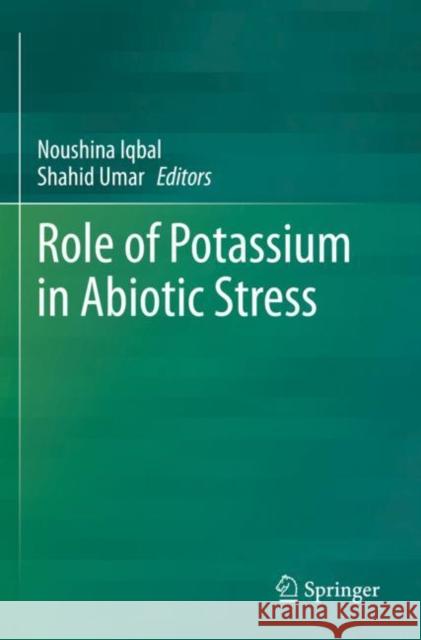Role of Potassium in Abiotic Stress » książka
Role of Potassium in Abiotic Stress
ISBN-13: 9789811644634 / Angielski / Miękka / 2023 / 281 str.
This book on potassium in abiotic stress tolerance deals with the ongoing trend in increasing abiotic stresses and interlinked issues food security. As mineral nutrient potassium holds an important place in agriculture and is involved in various physiological and biochemical processes. It takes part in protein synthesis, carbohydrate metabolism, enzyme activation, cation-anion balance, osmoregulation, water movement, energy transfer, and regulates stomata and photosynthesis. Potassium plays an important role as abiotic stress buster. This book will deal with potassium relevance to plant functions and adaptations, range of its biological functions, role of potassium in abiotic stress tolerance, analyses of mechanisms responsible for perception and signal transduction of potassium under abiotic stress, critical evaluation of and cross-talks on nutrients and phytohormones signaling pathways under optimal and stressful conditions, and interaction of potassium with other nutrients for abiotic stress tolerance. This book will be of interest to teachers, researchers, scientists working on abiotic stresses. Also the book serves as additional reading material for undergraduate and graduate students of agriculture, forestry, ecology, and environmental sciences. National and international agricultural scientists, policy makers will also find this to be a useful read.
This book on potassium in abiotic stress tolerance deals with the ongoing trend in increasing abiotic stresses and interlinked issues food security. As mineral nutrient potassium holds an important place in agriculture and is involved in various physiological and biochemical processes. It takes part in protein synthesis, carbohydrate metabolism, enzyme activation, cation-anion balance, osmoregulation, water movement, energy transfer, and regulates stomata and photosynthesis. Potassium plays an important role as abiotic stress buster. This book will deal with potassium relevance to plant functions and adaptations, range of its biological functions, role of potassium in abiotic stress tolerance, analyses of mechanisms responsible for perception and signal transduction of potassium under abiotic stress, critical evaluation of and cross-talks on nutrients and phytohormones signaling pathways under optimal and stressful conditions, and interaction of potassium with other nutrients for abiotic stress tolerance. This book will be of interest to teachers, researchers, scientists working on abiotic stresses. Also the book serves as additional reading material for undergraduate and graduate students of agriculture, forestry, ecology, and environmental sciences. National and international agricultural scientists, policy makers will also find this to be a useful read.











